雅思口语Part2话题范例:News
Question
Describe your favourite news source.
Sample answer
If I wanted to talk about the best news source, I would definitely pick TV channels as the superior medium. In the first place, it is really available almost everywhere. I usually turn to TV channels on a daily basis when I return home from work. I guess it is designed to hold the viewers attention for a short period of time which seems a perfect fit for today’s fast-paced life. In the second place, it presents the most recent round-up on the news providing the opportunity for us to see and enjoy live incidents by reporters on the scene. That’s why shared viewing of TV programs can bring families together even for a while. So, I always count on TV as a handy, reliable and efficient source of news.
In fact, TV is my favourite source for news and I watch TV news almost daily. With the fast pacing life, it is often tough to totally concentrate on radio news or daily newspaper and that's why for the last few years the TV news programs are becoming more and more popular. I can turn on my TV set and there are plenty of dedicated news channels to watch. The handiest part of the TV news is that you do not have to get 100% engaged on the TV set. I can do other things at the same time the news updates get in my ear.
The audio-visual presentation, the detailed coverage and modern facilities have made the TV news really easy to grasp. For all those reason my personal favourite source of news is Television.
Similar Cue Card Topics
Your ability to talk about this Cue Card would enable you to talk about the following Cue Cards as well:
Describe a TV program you have recently watched.
Describe a radio news program you often listen to.
Describe your favourite source for latest news.
第二篇:20xx年上半年雅思口语Part2话题全预测
20xx年上半年雅思口语Part2话题全预测
活跃话题:
Describe something you could do to help protect the environment
Describe a job you want to do in the future
Describe a practical skill(something you are interested in and want to learn more about it) Describe a childhood teacher who you want to meet again.
Describe an advertisement
Describe a new law (that makes the place you live better)
Describe a toy you played when you were a child
Describe a friend/someone/family member you admire
Describe a childhood hobby
Describe a person who speaks a foreign language
Describe a gift you gave to someone else
Describe an old person
Describe an old friend
Describe a modern building(that you think is interesting/on your campus)
Describe an item of clothing someone bought for you
Describe a naughty thing you did in childhood
Describe a place you usually go for meals(lunch/ your favorite eating place)
Describe a piece of advice someone gave to you
Describe a quiz show
Describe a successful person
低频或渐渐淡出的话题:
Describe a person you helped
Describe something you celebrate in your country/hometown
Describe a well-known story in your country
Describe a subject you studied in high school
Describe a change of your hometown
Describe a wild animal
Describe a film you saw recently
Describe something healthy you recommend to others
Describe a long-distance journey
Describe a place that you learnt about the past
Describe an artist
新生话题(与前6个月比;下划线为出现频率越来越高的话题,各位烤鸭需要特别注意): Describe a kind of foreign food you’d like to try
Describe an exciting message
Describe a project or some work that you did with others (showed team spirit)
A peaceful place
Some change you could make for your fitness
A good leader from your friends
An interesting piece of news
A child
A river
A beautiful place
A vehicle you want to buy/have
A visit you made to your family or friends
Your ideal room/house(you room in childhood)
A stage of your life
A person with the spirit of adventure
A broken electronic item
Something expensive you bought
Describe a (small) company that you think is very successful
Describe some changes you hope yourself can make
Desceibe a photo you remember
Describe an educational TV program
A historical building
A leisure center
A place near a lot of water(you visited when you were a child)
A book you enjoyed reading (in childhood)/ a kind of book you often read
Happy event at school(in childhood)
马良20xx年3月口语卡片预测(适用于3.5、3.12、3.19)20xx年02月28日 16:18:45 重点话题
1. Describe something naughty that you did when you were a child.
2. Describe an event symbolizing the transition from childhood to adulthood.
3. Describe an interesting job that you want to do
4. Describe a successful person you know
5. Describe a museum you visited
6. Describe a teacher who you want to meet again.
7. Describe an ancient building you used to visit.
8. Describe a new law in your country.
9. Describe a car you would like to buy.
10. Describe your understanding of teamwork spirit.
11. Describe a lifestyle good for your health.
12. Describe a hotel that you used to live in.
13. Describe a traditional story of your country.
14. Describe an electronic device (except computers).
15. Describe something you did to improve environment.
16. Describe a noisy place you used to visit.
17. Describe a police woman you know.
18. Describe a kind of fashionable clothes in your country.
19. Describe a machine you often use.
20. Describe an education program you often watch.
21. Describe one of your friends with leaders’ characteristics.
22. Describe a practical skill that you want to learn.
23. Describe a piece of interesting news that you read.
24. Do you like studying at university or college? (确实是第二部分话题)
25. Describe a piece of exciting message you received.
26. Describe a piece of your own photo
27. Describe something that you saved money to buy.
28. Describe some changes of the city you live in.
29. Describe a piece of important advice that you took.
30. Describe a water place you visited.
31. Describe a piece of movie that you watched recently.
32. Describe one of your favourite transportations.
33. Describe an adventurous person you know.
34. Describe the influences of advertising.
35. Describe your experience of being late.
36. Describe a kind of foreign food you want to try.
37. Describe an apartment you used to live in..
话题范围
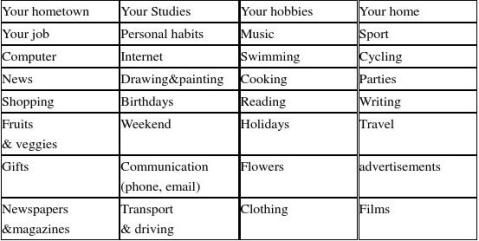
雅思口语第一部分是怎么进行的?
雅思口语第一部分提问模式非常固定,考官主要是按照下面几种模式想考生提问:
1. Do you…?
2.Do people in your country do??
3.What type of ?do you like?
4.What type of ?do you dislike?
5.What do you like about…?
6.What do you dislike about…?
7.What do you like to do +时间?
8.What do you dislike to do +时间?
9.Is it easy/difficult/convenient/safe/dangerous to do??
10.When did you first do ??
11.Did you do?when you were a child?
12.When did you last do ?? / Tell me about your last ?experience?
13.When and where do you??
14.Do you like do?alone or with friends?
15.Do you prefer A or B? Why?
16.Do you think it’s necessary/important for children/schools to do??
17.What do you think about..?
18.What do you think is the benefit/advantage of ??
下面我们以最近经常出现的几个话题为例,看看考官是怎么提问的?
Cycling
--Is it popular to ride the bike in your country?
--Do you often ride the bike?
--Is it safe to ride the bike in your city?
--What do you think is the advantage of biking compared with other forms of transport? Cooking
--Who cooks in your family?
--Do you like cooking? Why or why not?
--Do you think schools should provide cooking lessons for students?
Shopping
--Do you like shopping?
--Where do you like to go shopping?
--Do you like to go shopping alone or with friends?
--Do you prefer big shops or small ones? Why?
--Tell me about your last shopping experience.
Travel
--Do you like travelling?
--What places do you like to visit?
--Tell me about your last travel?
--What do you think is the benefit of travel?
从上面我们可以看出考官在提问时的九个提问方向:
一:你自己;
二:你们国家的普遍情况;
三:你的小时候;
四: 是最近一次;
五:小孩;
五:小孩
六:在学校学…重不重要;
七:同类比较优缺点
八:…的好处
九:为什么
(三)雅思口语第一部分的注意事项
1. 雅思口语第一部分的两大忌:
1)背诵答案
2)太多的简短答案(yes. No. I don’t know.)
2. 雅思口语第一部分的前奏
What’s you full name? or: Can you tell me your full name, please?
How shall I call you?
Can I see your ID card please?
3. 怎样在雅思口语第一部分给考官留下好的印象。
1)发音差的同学,应该把自己发得不好的音好好纠正一下。
2)语法不好的同学,应该好好学习一下一般过去时,现在完成时,现在 完成进行时,现在进行时和将来时;名词单复数;可数和不可数名词;人称代词;主谓一致;形容词比较级最高级。
3)学习一些英语是母语的人喜欢用的的口语词和短语。
4)克服自己的紧张情绪,经常进行自问自答练习或找人对练。
5)不要试图说得太多,适当扩展一下就行了。
6)说话不要太快,同时和考官保持眼神接触
4. 如何克服自己的表达方式过于简单,单调的问题。
很多同学得5分的一个主要原因就是表达方式过于简单,单调,如喜欢就是like, 表达原因就是because, 说好处就是good for health, 描述地方就是beautiful, 当然不是说这些词不好,关键是你从头到尾都用类似的词或短语的话,给考官的信息就是你的语言不行,别忘了,雅思纯粹就是考语言,就像普通话考试。
我给大家总结了几组大家很可能会用上的一些词和短语,基本都是中国考生不是很熟悉的一些表达方式,希望能对大家有所帮助。
第一组:Yes, I do; No, I don’t 之外的其它情况
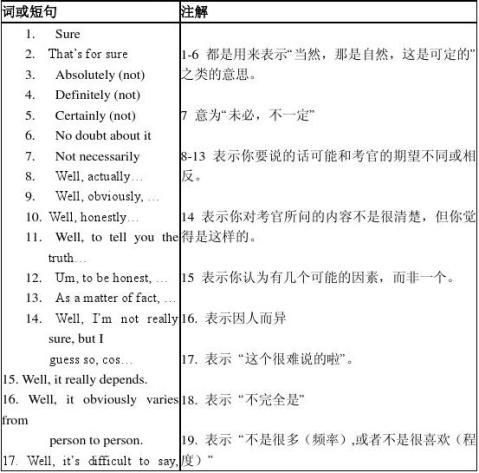
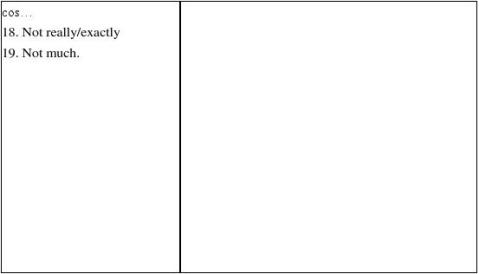
第二组:除了 I like…; I don’t like… 你还会说什么?
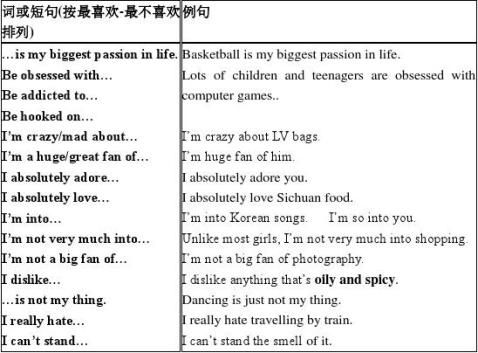
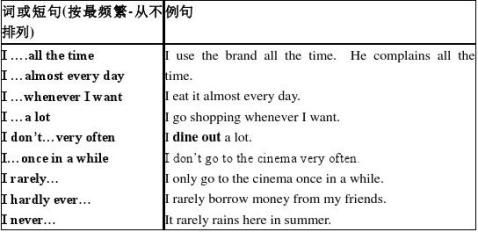
第三组:how often?
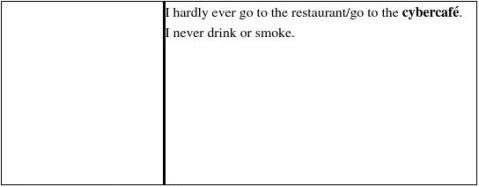
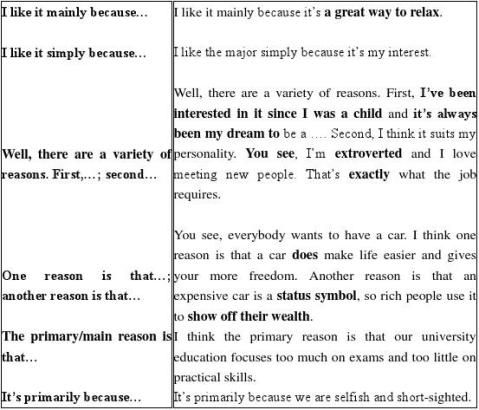
primarily due to our selfishness It’s primarily due to…
It’s mainly due to the that…
-time sedentary lifestyle.
It’s the result of…
it may be because they’re not happy about
It may be because…
may be because they’re too busy or too tired
at home, you know, modern life is
I’m not sure, but I guess one not sure, but I guess one possible reason is
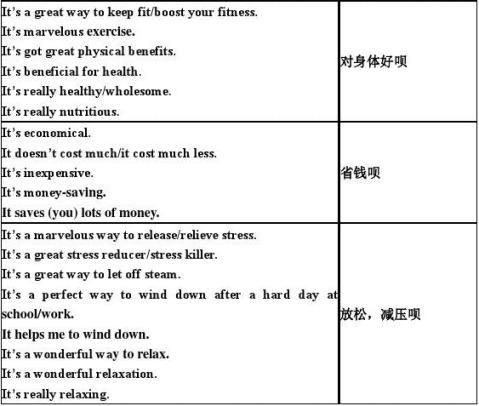
possible reason is…
For one thing… road, I have to breathe the dirty air. For another …
第五组:benefit/advantage
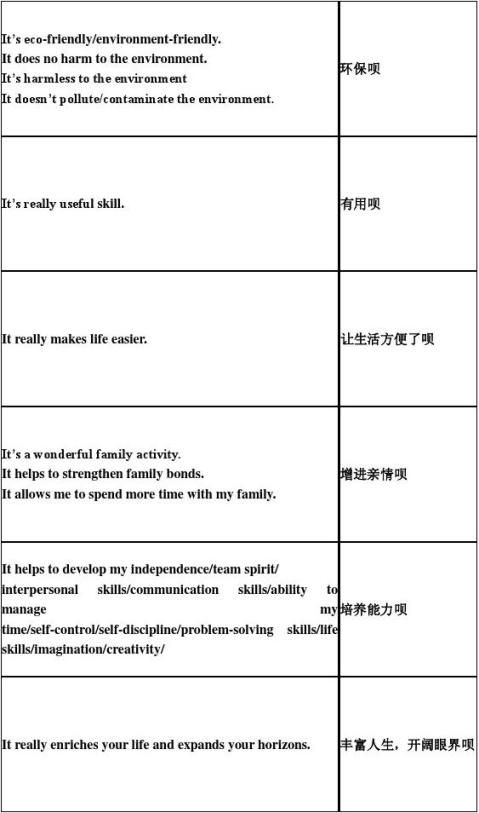
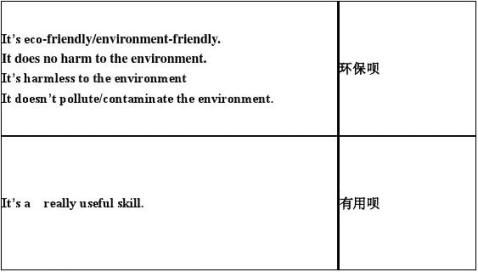
5. 如何让自己的话听起来更口语?
1. 不要试图说太长的句子。简单句为主,and, but, so, also, because, if 等连接一下即可。
2. 用一用 cos 引导原因
3. 用一用 like 举例
4. 停顿的时候,用well, eh, um, 或者 you know,占位。
5. 用一用 or whatever, and stuff like that, and something like that 表示“等等”
6. 在句首用上 actually ,basically, obviously, unfortunately, 等副词。
7. Most of the time, …, but sometimes … 这个结构很有用。
8. It depends, but generally …这个结构也很实用。
9. It varies. If …., I…, but if…, I… 这个结构也值得掌握。
10. 说朋友的时候,可用mate/buddy 代替
11. 说电影的时候可用flick/flicks 代替;同样 watch/see a film, 也可用catch a flick 代替。
12. 说好吃的时候,用tasty 或yummy 代替。
13. 说“很棒”的时候,用 “amazing, awesome, incredible, marvelous”
14. 说 “很美”的时候,用 “really pretty,attractive 或 gorgeous”
15. 说 “很次”的时候,用 “terrible/awful”.
16. 说 “很丑” 的时候,用 “really unattractive/hideous”
17. 说 “假货” 的时候,用 “fake”
18. 说 “贵”的时候,用 “pricey/dear”.
19. 说 “某东西很火”,用 “a smash hit”.
20. 说 “睡一会儿”,用 “catch some z’s. or catch forty winks”.
21. 说 “放松”, 用 “take it easy/wind down.”
22. 说 “一会儿,一段时间”,用 “a while”
23. 说 “上升” 用 “go up”, “下降” 用 “go down”.
24. 说“人很现实”, 用 “realistic”.
25. 说 “人很物质化”, 用 “materialistic”
26. 说 “流行,时髦”, 用 “in”, 最流行,最时髦,最时尚 “innest”。
27. 说 “老土”,用 “out of date/style”, 或者直接用 “out”.
28. 说 “最先进的”,用 “state of the art” .
29. 说 “我们玩得特爽” 用 “we really had a marvelous time”.
30. 英语 “寻找刺激”,英语是 “look for kicks”.
31. 表示 “很,非常”, 多用 “really”.
32. 表示 “极其,非常,绝对,相当…” 用,“absolutely, totally.”
33. 表示 “失落,沮丧”, 用 “down”.
34. 表示 “让…失望”, 用 “let sb down”.
35. 表示 “提神”,用 “pick me up”.
36. 表示“累”, 用 “exhausted/dead beat/worn out”.
37. 表示 “买或受到,接到”,用 “get”
38. 表示 “做某事花老半天,用 “it takes me ages”.
39. 表示 “和朋友一起玩儿”, 用 “hang out with my mates”.
40. 表示 “什么很好玩儿”,用 “…is great fun.”
41. 表示 “什么很搞笑”,用 “a good laugh 或者 hilarious.”
42. 表示 “荒谬”,用 “outrageous 或者 ridiculous”.
43. 表示 “什么的最大的好处”,用 “the best thing of ….is …”
44. 表示 “什么的最大的问题”,用 “The biggest problem with…is …”
45. 表示“东西,事情,物品,题材等概念时,” 用 “stuff”.
46. 表示“很多”用 “lot of” 或者 “loads of”
47. 表示 “有钱,条件好”, 用 “well off”。
48. 表示 “特别有钱”,用 “loaded”,或 “have money to burn.”
49. 表示 “穷”,用 “broke”.
50. 表示 “富人,穷人” 用 “the haves, the have-nots.”
51. 表示 “对…腻了,受够了”,用 “be fed up with…或者 have had enough of…”。
52. 表示 “城市里的激烈竞争”,用 “the rat race.”
53. 表示 “放十天假”,用 “have 10 days off.”
54. 表示 “我们俩生日就差2天”,用 “our birthdays are just 2 days apart.”
55. 表示 “还有半个月就是圣诞了,” 用 “Christmas is just half a month away.”
56. 表示 “捐钱或鲜血” 用 “give money/blood”。
57. 表示 “简单来讲”,这个口头语,用“to put it simply.”
58. 表示 “换句话讲“,这个口头语,用 “to put it another way”
59. 自然自语式的说 “怎么说呢”,用 “how shall I put it?”
60. 说让人很烦,很头痛的人或事,用 “a big headache或 a real pain.”
61. 说 “消磨时间”,用 “kill time.”
62. 说 “乏味,无聊的人或事”,用 “a real drag.”
63. 说 “累赘”,用 “a drag on sb.”
64. 说 “体重增加”,用 “put on/gain weight”.
65. 说 “减肥”, 用 “lose a few pounds 或者 shed a few pounds.”
66. 说 “锻炼”,用 “get exercise或 work out.”
67. 说 “瘦身”,用 “get slim/thin.”
68. 说 “偶像”,用 “idol.”
69. 说 “崇拜”,用 “idolize.”
70. 说 “娱乐圈”,用 “showbiz.”
71. 说 “花哨,” 用 “showy.”
72. 说 “名人”,用 “ a big name.”
73. 说 “名声好坏”,用 “a good/bad name”.
74. 说 “从事某种活动所需要的最重要的东西或品质,” 用 “the name of the game.”
75. 说 “应有尽有”,用 “you name it.”
76. 说 “我们家狗的名字叫…”,用 “Our dog answers to the name of…”
77. 说 “很恐怖”,用 “scary.”
78. 说 “恶心”,用 “disgusting”.
79. 说 “一首歌,或一个名字朗朗上口,容易记住”,用 “catchy.”
80. 说 “景点”,用 “tourist spots”。
81. 说 “痘痘”,用 “spots”。
82. 说 “造型师”,用 “stylist.”
83.说 “电脑出问题了”,用 “something is wrong with the computer.”
84. 说 “太酷了,太棒了,” 用 “awesome”.
85. 说 “干某事需要多少时间,需要什么能力素质等”,用 “it takes…to do…”
86. 说 “极为震撼,极为漂亮”,用 “stunning.”
87. 说 “不是当老师的料”,用 “not teacher material.”
88. 说 “有时候我就想一个人待会儿”,用 “Sometimes, I just want some time alone.”
89. 说 “我很喜欢跟他们在一起,”,用 “I really enjoy their company.”
90. 说 “多陪陪他们”,用 “spend more time with them.”
91. 说 “他是一个特别好的人”,用 “He’s a terribly nice guy.”
92. 说 “特别挤,”用 “packed out.”
93. 说 “糟糕,差劲,次”,用 “lousy”
94. 说 “误会了我的意思”,用 “get me wrong”.
95. 说 “太帅了”,用 “groovy”.
96. 说 “聪明”,用 “smart.”
97. 说 “没什么比得上我妈做的饭”,用“Nothing beats my mum’s cooking”
98. 说 “不吃早饭”,用 “skip breakfast”.
99. 说 “我是个夜猫子”,用 “night owl.”
100. 说 ”上床睡觉“,用 ”turn in”. “睡懒觉” 用 “sleep in.”
4.明星的责任 5. 你对偶像崇拜的看法(尤其是青少年)。
想想,如果你在第二部分的卡片是:
Describe a place you know where the public may go to listen to music
You should say:
where this place it
what kind of people go there
what kind of music you can listen to there
and explain how you feel about this place.
那么你在第三部可能被问到什么样的问题呢?
4. 考官在第三部分如何提问
至于具体提问的方式,每个考官可能提问的方式有所不同,毕竟同一个问题可以有多种不
同的表述方式:如
How does A differ from B?
=How is A different from B?
=What is the difference between A and B?
但是,在第三部分通常是要你表达自己的观点,所以最常见的提问方式就是:
Do you think….? 或者 What do you think about…?
Why do you think some people??
Could you give me an example?
How are young people and old people different in their attitudes to…?
What do you think we can do to…?
How do you think…will change in the future? 等等。
5. 第三部分说多少合适?
部分考官喜欢让考生多说,这样他就可以少问些问题。这样做的前提是考生的口语能力比较强,但这种情况并不多见。通常考官在第三部分问的问题比较多,可能达到十个左右,这一方面是因为考生的答案比较短,考官需要不断提示考生从不同方面对答案进行扩充,如考官可能会叫你举个例子证明你的观点,或者给出原因。至于具体应该说多少,那就得看你能说到少了,考官看你说不下去了,通常会换个题目,或者引导你往下说。
6. 考官在这部分主要寻找什么?
首先,考官期望你能够和他进行交流,不希望看到长时间的停顿,所以考生可以想到什么就先说出来,不要等想好了再说,通常的说法是边想边说。你不要担心自己的观点很幼稚,这不会影响分数,考官主要看你能否表达自己的观点。
其次,考官期望你的回答不跑题,这需要大家认真听问题,如果没听懂,可以通过以下方式让考官帮助你:
Sorry, could you say it again please? I didn’t quite catch it.
Excuse me, what do you mean by “computer-literacy”?
Sorry, what does the last word mean?
Well, could you put the question another way?
如果,你想向考官确认你是否听懂了问题,你可以说:
So, you want me to??
最后,考官帮你之后,别忘了在回答前表示感谢:
Oh, I see/I see what you mean. Thanks.
如果,考官解释了你还没听懂,你可以让考官换个问题,这总比什么都不说强:
Sorry, I really have no idea what to say. Could you give me anther question?
或者:Sorry, I really don’t understand the question. Could you ask me another one?
7. 我该如何去准备第三部分?
其实最重要的还是要去扩充自己的词汇量,巧妇难为无米之炊嘛。如果时间紧,可以背背话题词汇。不过与此同等重要的还是要去看看最近常考的话题,争取自己事先有所准备,不打无准备之仗。
再者,大家要把自己喜欢用的连词练得滚瓜烂熟,尤其是发音要准。
比如:表达原因我喜欢用:I think it’s mainly because….
或者,I think the main reason is that…部分同学的main或mainly发得就不准确,容易和man/manly混。
再比如:表达某个事物的好处时,我喜欢用:I think the beauty of living in the city is the convenient transport, shopping and entertainment facilities.
这需要大家总结出来并把它们记在一起,并写上例句,天天练几遍,争取做到成为本能。只有这样考试的时候才能说得出来。
8. 我怎么去让自己扩展答案?
一个标准的答案应包括:你的观点+论据+总结
我们姑且将其总结成:
topic sentence+supporting details+conclusion
简称为:TSC
几乎所有的问题都可以用这个方式去扩展。这个方式最重要的部分是
要给出支持的论据,通常包括具体的例子,原因等。
现在我们就以上面的“名人”这个话题为例为大家进行详细的说明。
Would you like to be famous?
说明:这个问题显然需要你表达自己的意愿,并给出原因。
How can people get famous these days?
说明:这个问题的关键词是 “How”, 你只需说明一种现代人成名的方式就可以了。
示范:Well, as I know, the most common way for people to become famous is to join some famous contests, such as those talent shows on TV. If you become the champion, you become famous. Another way to become famous is to be an actor and actress. If you appear in a very successful film and you do a good job, you become famous immediately. In a word, it’s very easy to become famous nowadays as long as you have your own stuff and you catch the chance to show it to other people.
How did people become famous in the past?
说明:从现在谈到过去时考官常用伎俩,其目的很明显:能否正确使用动词过去时。所以常见动词的过去时大家一定要熟悉。
示范:how people became famous in the past? Um, I’m not sure because I don’t know much about that. I only know that when I was child, the most famous people were government leaders or national heroes like LeiFeng and some important scientists. They became famous through newspapers or textbooks.
